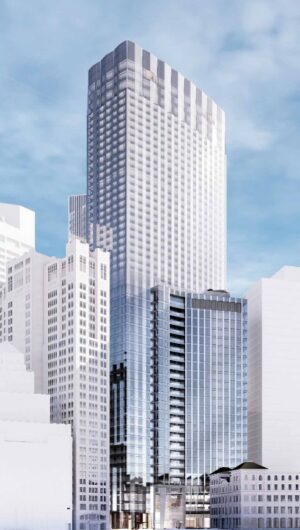
While some predict that large, in-progress projects like Millennium’s Winthrop Center tower could suffer delays in a coronavirus-caused recession, there are plenty of indications big investors are looking for new opportunities. Image courtesy of Handel Architects
It’s too early to call an end to Greater Boston’s epic building boom, even if the coronavirus has managed the turn the global economy and all our lives upside down in a few short months.
But in the dark days and months ahead as the deadly virus (cross those fingers) subsides and the task for rebuilding a battered economy begins, we may very well see a shakeout in the Greater Boston development market, culling some weaker and more tenuous projects.
Developers were riding a record-breaking wave of construction just a few weeks ago, with nearly 100 major projects under way within Boston’s city limits alone.
The pace of the coronavirus-driven downturn has been head-spinning, even for our frenetic, speed-obsessed age, exceeding that of even the Great Depression, which took years to fully play out.
Yet it would also be wrong to give way to fear-based doom and gloom, either.
Unlike the Depression – or the Great Recession, for that matter – at the heart of the downturn is not a crisis in the financial system, but rather the measures government officials across the world are taking to stop the spread of COVID-19.
And that raises the possibility that instead of a relentless slide down we may instead see an economic rebound, and maybe even a dramatic one at that, once the virus is finally brought under control.
“It’s very much uncharted territory and every day presents a new challenge with a problem to solve,” said Greg Vasil, CEO of the Greater Boston Real Estate Board.
Virus Disrupts Financing
Boston Mayor Marty Walsh last month became the first big-city mayor to order a temporary construction ban in a bid to slow the spread of the virus, but one local construction consultant is busier than ever.
James Kirby, chief executive of Commercial Construction Consulting, is now helping deep-pocketed pension funds evaluate a new crop of potential investment opportunities in projects in the Hub and across the country and the world.
Kirby said he is fielding calls from pension and sovereign wealth funds asking for help in evaluating projects that “were planning to start this year who have lost some or all of their financial backing recently.”
These are investors with a longer timeline, with the ability to weather the short-term crises and financial storms in order to get a return a decade out.
“This type of environment is too risky for the shorter-term investor, whereas many of our clients have the patience and ability to stay the course and ultimately be rewarded for it,” Kirby said.
“This type of environment is too risky for the shorter-term investor, whereas many of our clients have the patience and ability to stay the course and ultimately be rewarded for it.”
— James Kirby, CEO, Commercial Construction Consulting
Despite the short-term challenges, Kirby is sanguine about the longer-term outlook for development projects in Boston that have been temporarily forced to stop work amid the coronavirus crisis.
While it may take a bit longer for some smaller projects to get back on track, Kirby sees a rapid resumption in work on the major developments underway in Boston.
“For the stopped Boston projects, I expect them all to be [re]started,” Kirby said. “Most will recommence quickly after the work moratorium is lifted, and other smaller ones I expect may take a bit longer depending on the financial health of the parties involved.”
Shakeout Ahead
However, a new report by Newmark Knight Frank foresees a greater degree of turbulence ahead for new development in Boston, particularly in the office sector.
The commercial real estate firm’s research team predicts trouble ahead for some office tower projects still on the drawing boards, and significant delays even for projects that had been already under construction before the city shut down work.
The long-awaited South Station office tower and others that have permits and financing lined up are likely to break ground, according to the commercial real estate firm.
Millennium’s new office and condo tower at Winthrop Square, as well as new towers at One Congress Street and 321 Harrison Ave, despite being already underway before the moratorium, are among the projects who could see their schedules upended.
“Delivery timelines for projects already underway … will most certainly extend beyond current projections,” the report found.
Still, while there is 3.5 million square feet of new office space on which work is ready to resume after Boston lifts its temporary building ban, there are also millions more square feet of new corporate office suites that are still in the planning phases.
For these projects, the future today looks significantly darker than it did just a few weeks ago.

Scott Van Voorhis
“Some planned projects may get shelved,” noted NKF, which, in a bid to look on the bright side, adds this could “dampen the risk of oversupply in the Boston market.”
This sounds like a fair estimate. It’s hard to imagine there won’t be some serious fallout for Boston’s real estate market from the pandemic and the economic crisis it has triggered.
But when it comes to whether it’s finally curtains for Boston’s building boom, we shall just have to wait and see.
Scott Van Voorhis is Banker & Tradesman’s columnist; opinions expressed are his own. He may be reached at sbvanvoorhis@hotmail.com.




